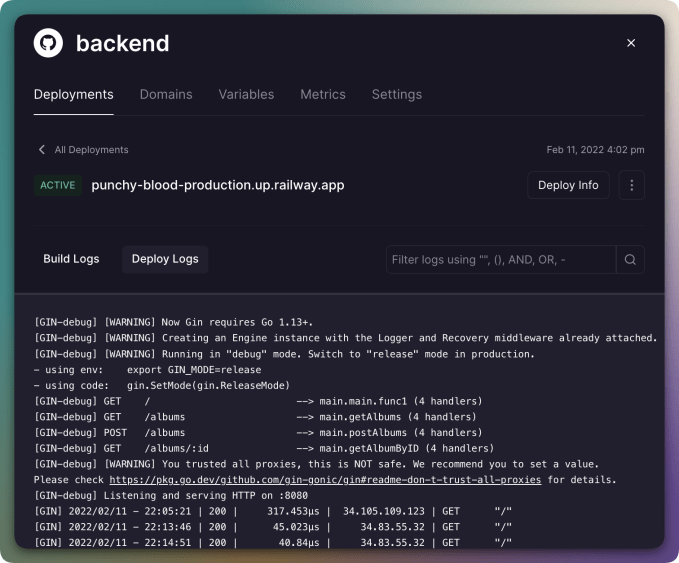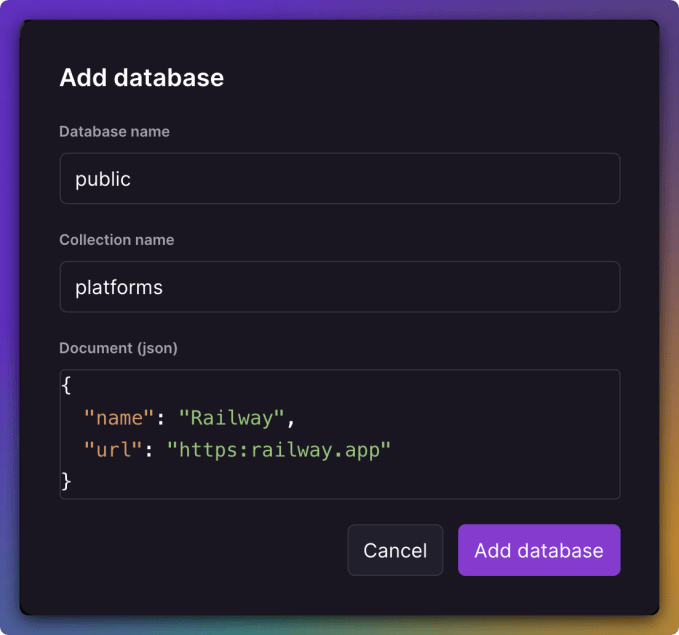Railway, a startup building a software deployment platform tailored for engineers, today announced that it raised $20 million in a Series A round led by Redpoint Ventures and angel investors including Vercel CEO Guillermo Rauch and GitHub co-founder Tom Preston-Werner. The capital brings Railway’s total raised to $24 million, which founder and CEO Jake Cooper said is being put toward continuing to expand Railway’s product with a focus on enterprise customers.
In a conversation with TechCrunch, Cooper said that he and Railway’s founding team was inspired to launch the platform by the dearth of support tools for deploying apps. Cooper was previously a software engineer at Wolfram Alpha, Bloomberg and Uber before co-launching Railway in 2020.
“When I was first learning to code, building software was a magical experience. Fast forward a decade later, and all current iteration of infrastructure tooling requires deep infrastructure knowledge … and a fleet of DevOps engineers to ship a simple app to production,” Cooper told TechCrunch via email. “In our minds, both users and companies alike will require better, more accessible tooling for their engineering teams to move quickly and build category defining products. Railway today allows engineers to … ‘automagically’ receive industry best practices for building and deploying apps.”
Traditional app development might require drawing up architectural diagrams and weaving together services across public clouds like Amazon Web Services, Microsoft Azure and Google Cloud Platform. In contrast, Cooper said, Railway provides a dashboard for building, deploying and monitoring apps and services, either from a bird’s-eye view or down to the individual level.

“In our mind, the number one challenge that the industry currently faces is ‘compute accessibility.’ Compute is one of the, if not the, most powerful tools available to people. Current iterations of cloud infrastructure tooling lock this experience behind complicated yaml or unintuitive dashboards,” Cooper said. “Railway is building an engine to unleash the full potential of compute and make it accessible to any user, anywhere in the world. We see ourselves as a ‘next-generation cloud’ that works with the user instead of against them.”
Recently, Railway launched what it calls the “infinite shipping canvas,” which allows users to say what they want in natural language (e.g.”Give me a PostgreSQL database,” “Deploy this GitHub repo”) and get a running version of that infrastructure. Railway keeps track of the services and configurations under the hood and redeploys them based on changes to the infrastructure.
“Oftentimes with engineering organizations, it’s not even a matter of ‘How expensive is it?’ but a matter of ‘How many quarters will it take?’ Time is the currency of engineering teams and leaders, and so when it comes to ‘Why should your CTO/VP/director care about this?,’ our answer is that Railway can cut your architectural implementation time from months to minutes,” Cooper said. “Railway as a lifecycle management engine that bridges the gap between development and production. In our ideal future, builders have time to focus on their core products without worrying about how to deploy them.”
Railway’s traction is impressive to be sure. Cooper claimed that Railway has been used by more than 50,000 developers, including AI-powered fire prevention service Fion Technologies, to launch more than 900,000 projects. User growth over the past year increased 30x and 90% in the last month alone. And while while Cooper didn’t reveal exact numbers, he said that revenue is growing anywhere between 20% to 50% month-over-month.

“The platform now has over 1,000 people on the developer and teams plans, ranging from high-growth companies all the way to indie developer hobby projects,” Cooper continued. “The pandemic has been a massive accelerator for companies looking to adopt high leverage tooling to increase efficiency of managing their infrastructure. Collaboration and automation, things Railway excels at, are key and so things like preview environments, linking directly to cloud logs, and fully reproducible local experience using the command line are all things that have been massively helpful in selling our businesses value as orgs go cloud native … Railway is an incredibly powerful tool today, and we’ve only just scratched the surface of what we want to do.”
San Francisco, California-based Railway has just eight people on its payroll. But with the funding, the company plans to grow the team to 12 to 15 members by the end of the year, with an emphasis on technical roles.






























Comment